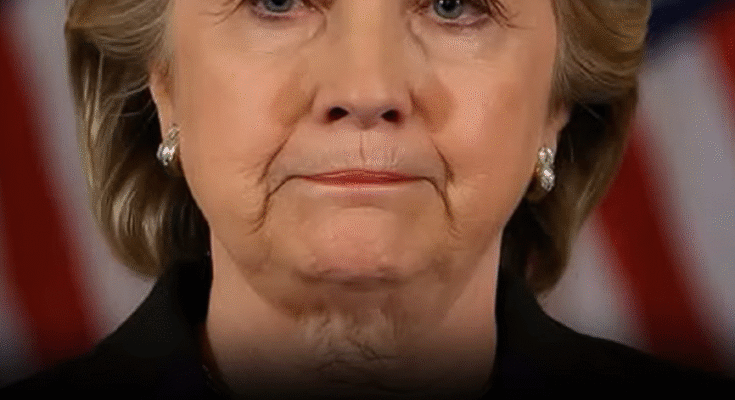A Farewell That Redefined the Stage: Hillary Clinton’s Next Chapter Begins
Under the soft glow of stage lights in a packed New York City auditorium, history paused. One of America’s most enduring and complex figures stood before an audience brimming with curiosity, reverence, and anticipation. What followed wasn’t just a speech—it was a seismic shift. With the same poise that carried her through decades in public life, Hillary Rodham Clinton began with five simple, soul-stirring words:
“This isn’t easy… but it’s time.”
The atmosphere changed instantly. The room, once expectant, became electric. This was more than an announcement—it was a turning point, a moment of consequence. In this article, we explore the significance of Clinton’s declaration, the arc of her extraordinary life in public service, and the legacy she now passes on to a new generation of leaders.
A Trailblazer Like No Other
For nearly 50 years, Hillary Clinton has stood at the volatile crossroads of power, progress, and pushback. From the Arkansas governor’s mansion to the halls of the U.S. Senate, from the State Department to the edge of the presidency, her résumé reads like a blueprint for American public life.
She didn’t just hold titles—she transformed them. As First Lady, she championed health care reform and women’s rights on a global stage. As Senator, she forged unexpected alliances. As Secretary of State, she navigated a chaotic world with strategic resolve. And in 2016, she shattered political precedent by becoming the first woman to clinch a major party’s presidential nomination.
But even for the fiercest pioneers, a moment arrives when the path forward must be reimagined.
A Stage Set for Reflection
The setting was intimate, symbolic: the Claire McCarthy Auditorium at Columbia University—an institution Clinton has long supported through lectures and philanthropy. This was not a campaign stop. It was billed as a “Personal Address to the Nation”—a phrase that hinted at finality but promised sincerity.
Every seat was filled. Cameras clicked. Journalists waited. Behind her, a simple banner read: “A New Chapter.” And yet, despite the muted set design, the energy in the room was anything but quiet.
When Clinton stepped onto the stage, the applause was thunderous—but it faded quickly into a respectful hush. What came next was more than a speech. It was a reckoning—with legacy, identity, and purpose.
“It’s Time”: The Words Heard Around the Country
Her voice was steady but introspective as she dropped the news few saw coming: she would be stepping away—not from advocacy, not from public service—but from the political front lines.
“After months of reflection and long conversations with those I trust most—my family, my colleagues, my friends—I have decided it’s time for me to step back from the political arena,” she said.
This wasn’t retreat. It was renewal. Clinton framed her decision as an act of evolution—not surrender. It was time to open space for new leaders, to uplift fresh voices, and to dedicate herself more fully to the causes that have long defined her life.
“This is not goodbye,” she emphasized. “It’s a redirection.”
A Life Revisited with Grace
What followed was a powerful, personal retrospective. Clinton didn’t dwell on victories; she honored the journey. She spoke of her formative years—of Wellesley, Yale, and the Children’s Defense Fund. Of her mother, Dorothy, whose resilience lit the path. Of barriers faced, battles fought, and the lessons carved from each.
She revisited pivotal moments: the bruising health care debates of the ’90s, her now-iconic Beijing speech declaring “women’s rights are human rights,” the painful aftermath of 9/11 as a New York Senator, and the global crises she helped steer through as Secretary of State.
And yes, she addressed 2016—not with bitterness, but with reflection.
“That loss changed me. But it did not break me. It reminded me that even in defeat, there is purpose.”
A New Role for a New Era
Clinton outlined a bold future—not in silence, but in service. She will now focus her efforts on three transformative initiatives:
- Global Girls’ Education: In partnership with international NGOs, she will work to expand access to education for girls in regions plagued by poverty, conflict, and gender discrimination.
- Civic Engagement in America: Clinton plans to launch a nonpartisan campaign to teach young Americans how democracy works—arming them with knowledge, tools, and truth in an age of disinformation.
- Women’s Economic Empowerment: Through public-private collaborations, she aims to elevate women in business, close wage gaps, and boost representation in STEM and leadership roles.
“I want to use this chapter to lift others—especially those who’ve never been invited to the table,” she said.
Applause from All Sides
The response was immediate. From both allies and former rivals, tributes poured in. President Biden hailed her as “one of the most influential Americans of our time.” Michelle Obama praised her as “a trailblazer who opened the door wider for millions.” Even Condoleezza Rice offered respect, citing Clinton’s “steady hand and tireless diplomacy.”
On social media, hashtags like #ThankYouHillary and #Trailblazer trended for hours. Stories surfaced from young activists, inspired voters, and first-time candidates who saw themselves in her story.
Criticism and Complexity
As expected, not everyone applauded. Some conservative commentators called it a calculated retreat. Others suggested it was an attempt to maintain behind-the-scenes influence. But even among critics, there was a grudging consensus:
“You can disagree with her politics,” one pundit wrote, “but you cannot deny her impact.”
A Party at a Crossroads
For the Democratic Party, Clinton’s departure marks the end of an era. She has been a defining force for decades—shaping platforms, debates, and strategies. Her exit from the political spotlight leaves space. And that space may become a launchpad.
Rising figures like Alexandria Ocasio-Cortez, Raphael Warnock, Pete Buttigieg, and others now step into fuller view. With Clinton’s blessing, they inherit both the responsibility and the opportunity to lead.
“It’s time for a new generation—diverse, bold, unafraid,” Clinton said. “The future belongs to them.”
Institutions Honor the Legacy
Clinton’s transition was met with more than praise—it sparked action. Several new initiatives were announced in her honor:
- The Clinton Fellowship for Public Leadership at Georgetown University
- The Rodham Center for Civic Engagement, a joint project with the National Civic League
- Global Girls Forward, a UNICEF program providing scholarships to 50,000 girls by 2030
These are not memorials. They are missions—proof that Clinton’s influence will extend well beyond the ballot box.
A Final Word—and a National Challenge
She closed with a call to action that was unmistakably hers: urgent, hopeful, unflinching.
“Democracy is not a spectator sport. It requires participation, vigilance, and above all—hope. I’ve had my turn on the front lines. Now it’s yours. Run. Organize. Speak. Build. The story of this country belongs to all of us.”
The Grace of Letting Go
In a political age too often defined by ego and permanence, Hillary Clinton’s decision to step back may be her most defining act of leadership yet. She’s not clinging to relevance—she’s cultivating it differently. Passing the torch, not dropping it.
Whether you admired her, opposed her, or simply observed her, one thing is clear:
Hillary Rodham Clinton changed the rules. And now, in stepping aside, she may change them once again.



